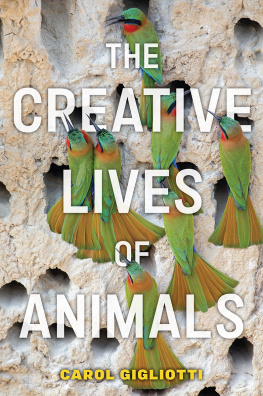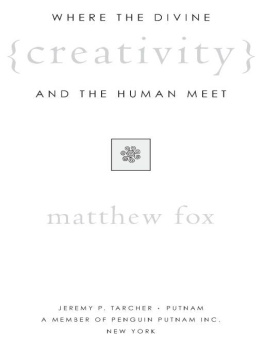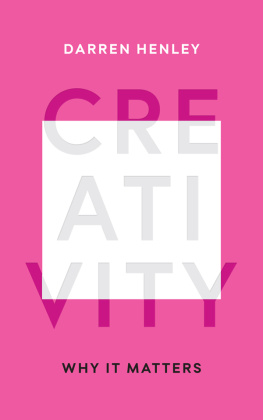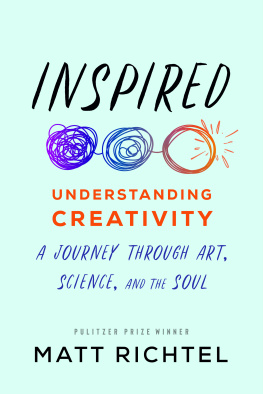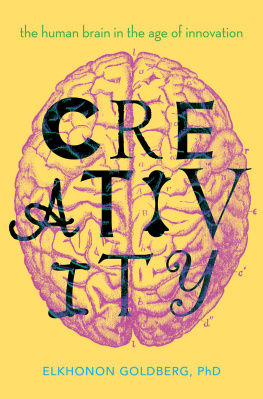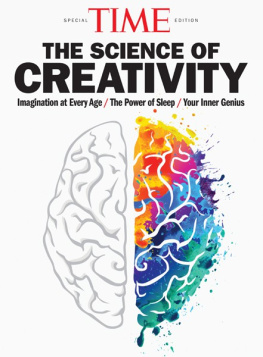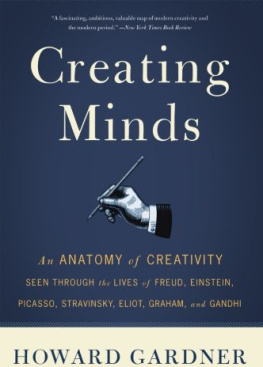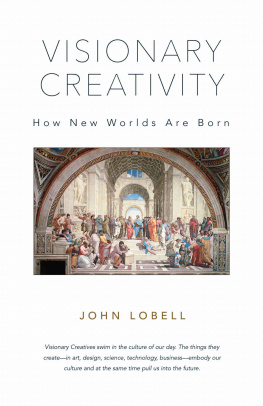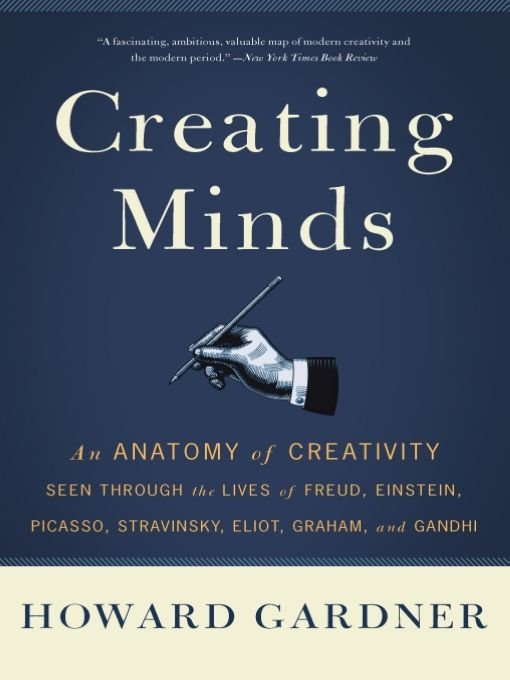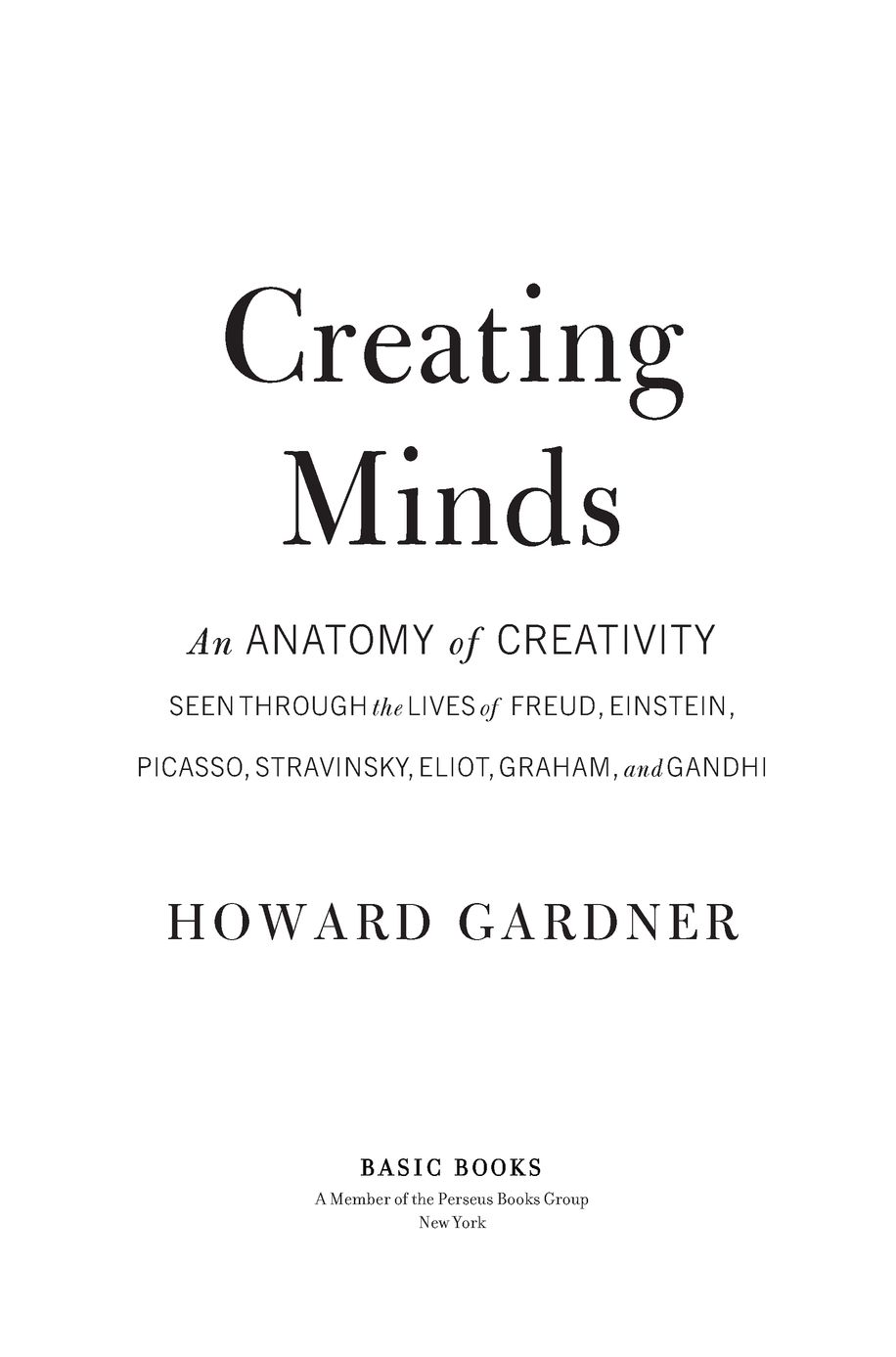Table of Contents
Praise for Howard GardnersCreating Minds
A humanistic spirit pervades [Creating Minds].... Gardner isnt trying to reduce creativity to maze-running.... He is tentative rather than dogmatic, attuned to exceptions and complexities as well as commonalities.
The Houston Chronicle
Gardner may well have uncovered some fundamental aspects of the creative personality and of the process of creativity. His discussion will inevitably open up more of this fascinating territory.
New Scientist
[Gardners] books are lucid, cross-disciplinary examinations of heady topics: Creating Minds... and Leading Minds... are rarities, being academic studies that are as readable as they are compelling.
The Boston Globe
Mention Howard Gardners name to a growing cadre of educators and the response verges on the reverence teenagers lavish on a rock star.... [Creating Minds] is sure to get attention not only for Gardners typology of intelligence but also because of his guru-like status.
Newsweek
One of the notable characteristics of creativity that Howard Gardner emphasizes in this new study is the special amalgam of the childlike and the adult: Creative personalities, he argues, often display features such as innocence and freshness, as well as selfishness and retaliation.... Their demanding personalities and devotion to their own creative breakthroughs (which tend, Gardner argues, to take place at 10-year intervals) also make creative people very hard to live with. But the creative process depends upon the support of caring individuals.
Washington Post
Few things inspire more wonder than the power of genius.... Gardner derives his view of genius from his earlier, groundbreaking research on the specialized nature of intelligence.... From this perspective, he questions whether creative minds of the caliber of Freuds or Einsteins will ever come to dominate the 21st century. These earlier geniuses made their mark by challenging the well-established thinking of the day. But today, Gardner says, there is really no such thing as establishment thought.
US News and World Report
[Gardners] enthusiasm and long experience show. Creating Minds is a stimulating work that fulfills the authors wish to write a book of the sort he himself likes to read: a jargon-free one with only the most essential visual aids.... Gardners writing style is remarkable in other regards too. He is a fluent writer, at great ease with the English languageand so confident of his ideas that he is not afraid to express them clearly.... Everyone who is interested in understanding and fostering creativityand maybe that should be all of usshould read this rich, enthusiastic book to learn more about creativity, about seven fascinating creative mindsand maybe about the creative potential of ourselves and those in our care.
Times-Picayune (New Orleans)
Rejecting the idea that creativity can be measured on a single linear scale, [Gardner] argues instead that many forces are at work to drive the creative individual, including such unexpected motivations as competition, ego, vanity and fear of death. This is a nice thought for those of us who feel that if pushed enough we could all write the next great symphony.
The Dallas Morning News
[This] groundbreaking work on brain functioning by Harvard researcher Howard Gardner has shed further light on the vitality and centrality of imagination and its close intellectual relatives.
Pittsburgh Post Gazette
[A] boldly ambitious study.... Each of the seven creative geniuses whom Gardner incisively limns transcended interpretive frames or conventions that became entrenched during the 19th century; each forged a new system of meaning; and each, in Gardners view, struck a Faustian bargain, sacrificing a rounded personal life for the sake of an all-consuming mission.... This highly stimulating synthesis illuminates the creation of the modern age.
Publishers Weekly
A delightful look at creativity... rich, readable, and thought-provoking.
Vision
Gardner has uncovered other intelligences we had failed to notice because we had no tools sensitive enough to measure them.
Business World
It takes chutzpah to come up with a scheme for analyzing creativityespecially in subjects already exhaustively examined. But for psychologist and MacArthur fellow Gardner (Harvard Graduate School of Education), it amounts to a natural progression from his earlier dissections of intelligence.
Kirkus Reviews
Illuminating and entertaining, Creating Minds provides an unforgettable synthesis of the ideas that have shaped contemporary culture.... As the guide in this tour of the theater of the mind, Gardner is at his best: insightful, civilized, and precise. I cant think of a more stimulating book about creativity.
Mihaly Csikszentmihalyi, author of Creativity
Creating Minds is both informative and a wonderful read.
Robert Ornstein, author of Roots of the Self
OTHER BOOKS BY HOWARD GARDNER
The Quest for Mind (1973)
Arts and Human Development (1973)
The Shattered Mind (1975)
Developmental Psychology (1978)
Artful Scribbles (1980)
Art, Mind, and Brain (1982)
Frames of Mind (1983)
The Minds New Science (1985)
To Open Minds (1989)
The Unschooled Mind (1991)
Multiple Intelligences: The Theory in Practice (1993)
Leading Minds (with Emma Laskin) (1995)
Extraordinary Minds (1997)
The Disciplined Mind (1999)
Intelligence Reframed (1999)
Good Work (with Mihaly Csikszentmihalyi and William Damon) (2001)
Changing Minds (2004)
Multiple Intelligences: New Horizons (2006)
The Development and Education of the Mind (2006)
Five Minds for the Future (2007)
Truth, Beauty, and Goodness Reframed (2011)
For Andrew
Benjamin
Jay
Kerith
ACKNOWLEDGMENTS
NUMEROUS COLLEAGUES GENEROUSLY read and commented on sections of this book. I should like to thank Mihaly Csikszentmihalyi, William Damon, Rupen Das, Iris Fanger, Ina Hahn, Gerald Holton, Arthur Miller, Ricardo Nemirovsky, Robert Ornstein, David Perkins, Dean Keith Simonton, and Ellen Winner. For information about Martha Graham I owe a special debt to Jane Sherman. With thanks and with sadness, I acknowledge the invaluable help of my friend Stephen Albert, a great composer and a wonderful critic, who died in December 1992.
At Basic Books, Susan Arellano, Martin Kessler, and Jo Ann Miller provided valuable editorial suggestions. Several colleagues at Project Zero, including Karen Donner Chalfen, Lela Collins, Samantha Kelly, and Mindy Kornhaber, helped with the preparation of the manuscript; Emma Laskin played an indispensable role during the last year in helping me with every facet of the book, from chasing down a footnote to clarifying an obscure thought. For their help in the final phases of publication, I would like also to thank Melanie Kirschner, Michael Mueller, and Sharon Sharp. Cynthia Dunne and Joan Greenfield are responsible for the books attractive design.



